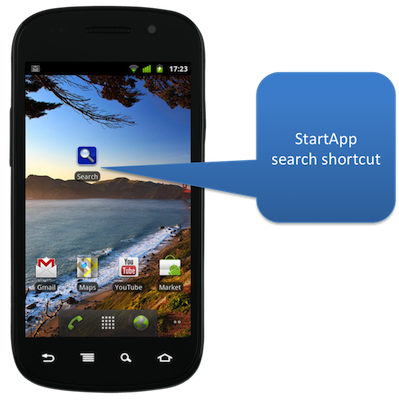StartApp is a new monetization and distribution platform for Android applications designed to address the challenges the platform has created in terms of revenue generation for developers. Using the new StartApp SDK (software development kit), developers can receive $10 – $50 per 1,000 downloads, the company claims. This is higher than the $4 average per 1,000 downloads developers see elsewhere, StartApp says.
Sounds great, right? What’s the catch?
When Android users download StartApp-monetized applications to their phone, a new search icon and bookmark link appear on the device automatically. That’s right – bundled software! It’s not all that different from the ad-ware supported desktop applications of years past. Whenever a user searches the Web via StartApp’s portal, StartApp generates revenue which can then be shared with the developer.
Developers have two options for payments: either up-front pay-per-downloads or ongoing revenue sharing from the new search option. The up-front model provides $50 per 1,000 downloads in the U.S. and $10 per 1,000 international downloads.
To be clear, StartApp requires that developers explain to users that the new search option is a part of the download, that it doesn’t replace any default options they have and if users don’t want to use it, the icon can simply be deleted from their homescreen.
Prior to the company’s official launch (planned for Tuesday), StartApp has been integrated into 50 apps and has seen nearly 1 million downloads.
Given developers failure to effectively monetize applications on Android, it’s not surprising that new revenue models are being created. For example, earlier this month, third-party mobile application store GetJar introduced a premium catalog of free Android apps, sponsored by featured search listings on the GetJar site.
The difference between the GetJar model and StartApp, however, is not just in how they leverage search as a monetization mechanism, but in their willingness to aggravate the end user. In GetJar’s case, there’s barely a problem – some app listings in search results are marked “featured.” In StartApp’s case, though, users have to perform cleanup on their devices to remove the extra icon and bookmark.
Unfortunately, many users will not be savvy enough to do so. And the innocuous “search” icon will be tapped again and again.
This may be an effective revenue model as StartApp claims, but at what cost to the overall Android ecosystem? That’s a question developers, especially Android-only developers, should carefully consider.


